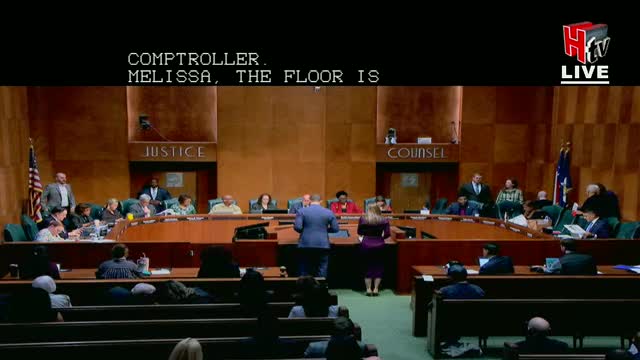Houston controller projects roughly $125 million FY26 draw; audit finds fuel‑card misuse and warns of SNAP fallout from federal shutdown
Get AI-powered insights, summaries, and transcripts
Subscribe
Summary
The city controller presented the 3+9 and monthly financial reports for the period ending Sept. 30, 2025, projecting a larger draw on fund balance for FY26 and reporting audit findings on fuel‑card controls. Officials warned the prolonged federal shutdown and partial SNAP payments are straining residents and city services.
The city's controller, identified in the meeting as Melissa, told Houston City Council on Nov. 5 that the controller's office projects an ending general fund balance of about $303.4 million — roughly 11.9% of expenditures excluding debt service and pay‑as‑you‑go items — and that current estimates mean the city will likely draw approximately $125 million from reserves to balance the adopted FY26 budget.
Melissa said the controller's projection is roughly $70.1 million lower than a separate projection by the finance department, with the difference driven largely by a lower revenue forecast and an adjustment to property‑tax receipts following the recently adopted tax rate. The controller also said transfers and expenditure assumptions have changed, noting higher projected security costs for public libraries and other modest expenditure increases.
The controller's audit of the city's fuel‑card program found systemic control weaknesses. The audit said the program — covering roughly $5 million in annual purchases and more than 1,000 vehicles — showed that nearly two‑thirds of purchases were made at commercial stations even when a city fueling station was available, that more than 300 active fuel cards were assigned to vehicles not listed in fleet records, and that 90% of monthly reports reviewed lacked evidence of supervisor review. The auditors recommended tightened monitoring, securer card controls, improved training and accountability by departments.
Council members pressed staff about the risks the controller described. Council members and staff discussed how a prolonged federal government shutdown is already increasing demand for food assistance and other services in Houston. The controller and councilmembers said recent court orders that released only partial SNAP payments for November combined with federal furloughs are straining nonprofit and city programs; they cited lines at recent distributions and growing pressure on food banks and groups such as Meals on Wheels.
Council members asked staff for more detail on potential cost exposures to the city, including sales tax sensitivity and other revenue risks. The administration said it will continue monthly reporting and provide additional analysis on sales tax performance, expected savings from efficiency projects and the timing of projected expenditure reductions.
The council adopted the quarterly financial report later in the meeting by voice vote after the presentation.
